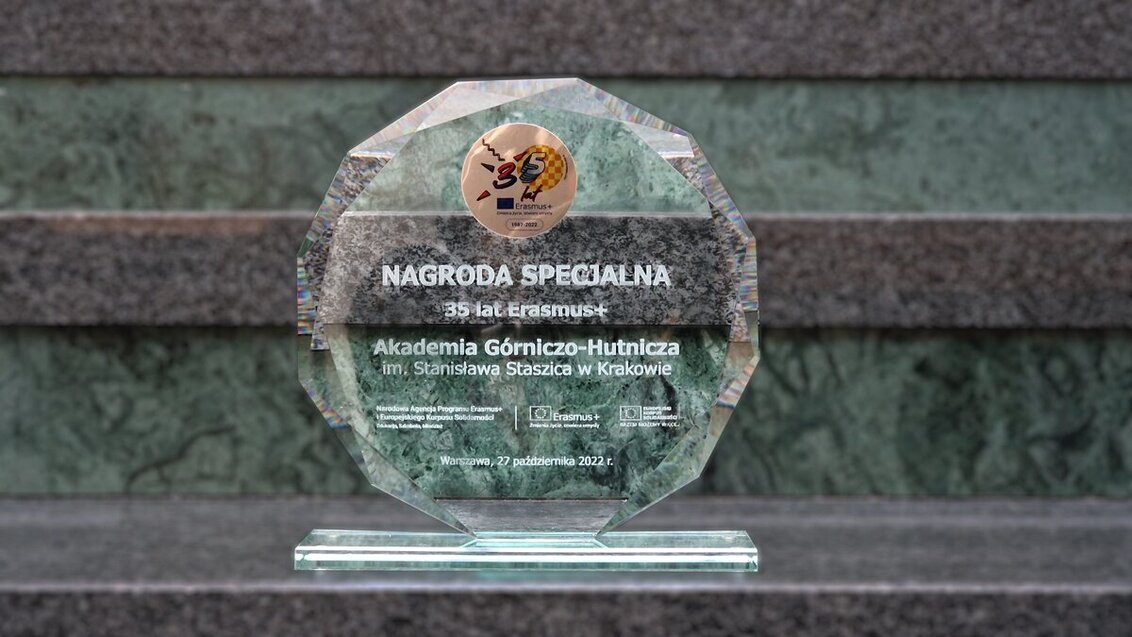The AGH UST received a special award on the occasion of 35 years of the Erasmus+ programme. The commemorative statuette was presented to Professor Jerzy Lis, AGH UST Rector, during the 5th Education Congress.
Our university was one of the first higher education institutions in Poland to receive more students than the numbers contracted in the exchange agreements. This was possible thanks to the consistent policy of university authorities, as well as the implementation of multifarious solutions in the field of internationalisation. The assembly of experts who founded the award also appreciated the fact that the AGH UST eagerly shares its experiences with universities in partner countries within the framework of projects like Capacity Building in Higher Education. What is equally important is the active membership of our university in the UNIVERSEH consortium, that is, an association of European Universities, a flagship initiative of the European Commission.
Receiving the award from the hands of Dr hab. Paweł Poszytek, Director General of the Foundation for the Development of the Education System (FRSE), Director of the Polish National Agency of the Erasmus+ Programme and the European Solidarity Corps, the AGH UST Rector said that we are all to be praised because ‘we are all the Erasmus family’.
***
The Erasmus+ Programme is the most popular exchange initiative at the AGH UST. Thanks to the programme, thousands of international students have visited our university from various countries that participate in the initiative; mainly from Turkey, Spain, France, Romania, Portugal, Italy, Greece, Germany, Croatia, but also from Albania, Georgia, Macedonia, Slovenia, Finland, the Netherlands, Iceland, Panama, Russia, Ukraine, the USA, and Hungary.
This past academic year, the AGH UST concluded 559 agreements within the 2021–2027 edition of the programme. This edition, however, features many modifications, including new types of mobility and activity, i.e. blended mobility, several-days-long trips for students, or the possibility to organise BIPs – Blended Intensive Programmes.
***
Erasmus+ is an EU programme that supports academic exchange. It allows students to study abroad, participate in international professional mobility initiatives, and carry out international educational projects. The aim of the programme is to support students, teachers, and volunteers in the implementation of international projects to expand their professional qualifications.
The European budget allocated to the programme for the years 2021–2027 stands at 26.2 billion euros. Along with the new financial perspective, the premises of Erasmus+ have been expanded. As a result, the programme became much more innovative, inclusive, and digitally accessible. Additionally, it will also be of great significance for the European Education Area, which is scheduled to launch in 2025.
The Foundation for the Development of the Education System was selected to implement the programme in Poland through a special agency – the Polish National Agency of the Erasmus+ Programme.
***
The 5th Education Congress, organised by FRSE, took place on October 27, 2022 in the University of Warsaw Auditorium Maximum.
The event schedule included a panel on the aforementioned European Education Area. The new initiative aims to provide all young people with access to top-quality education and trainings, facilitate mobility in terms of switching education systems across various countries, and give them the opportunity to find employment in Europe. Several strategic areas of cooperation have been established: improving quality and providing equal access to education and trainings, supporting teachers and educators, introducing environmental and digital education, fostering international cooperation, and promoting Europe as a strong partner in the field of education.
What does this actually mean for Polish nurseries, schools, and universities? The following figures tried to answer this intricate question: Prof. Jerzy Lis, AGH UST Rector, Prof. Piotr Stepnowski, University of Gdańsk Rector, and Dr Janusz Michałek, President, Chairman of the Board of Katowice Special Economic Zone.

 Pre-election meeting with a candidate for the position of rector
Pre-election meeting with a candidate for the position of rector  Agreement on cooperation with OPAL-RT
Agreement on cooperation with OPAL-RT  Krakow DIANA Accelerator consortium members with an agreement
Krakow DIANA Accelerator consortium members with an agreement  Meeting with the Consul General of Germany
Meeting with the Consul General of Germany  More Academic Sports Championships finals with medals for our students
More Academic Sports Championships finals with medals for our students  Launch of AGH University Student Construction Centre
Launch of AGH University Student Construction Centre  Bronze for our swimmers at Academic Championships
Bronze for our swimmers at Academic Championships  Smart mountains. AGH University scholar develops an intelligent mountain rescue aid system
Smart mountains. AGH University scholar develops an intelligent mountain rescue aid system